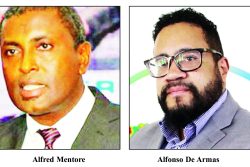Last week I spoke of the growing perception, even among the supporters of the APNU+AFC government, that what happened at the last general elections was, as they say on the streets, an exchange not a change of government. This assessment of the ‘person in the street’ is not without substance. For example, after lambasting the PPP/C for rejecting the collective bargaining process and unilaterally imposing salary increases on public servants and promising in its 2015 election manifesto to ‘enforce the principles and laws governing collective bargaining in accordance with our commitments under the International Labour Organisation [and] restore collective bargaining for all the relevant elements of the public service’, the government is now doing essentially what the PPP did!
 Notwithstanding this kind of behaviour, I argued that the exchange scenario is too simplistic and is only a symptom of a more fundamental condition, namely our ethnic divide, which disenfranchises most of us by making our vote meaningless. By this I mean that a vital element of a vote is its capacity to secure an alternative government but that since most of us have given up this element, the party in government need not pay much mind even to its own supporters. However, this is not an outcome of our individual or collective desire; it is structural disenfranchisement!
Notwithstanding this kind of behaviour, I argued that the exchange scenario is too simplistic and is only a symptom of a more fundamental condition, namely our ethnic divide, which disenfranchises most of us by making our vote meaningless. By this I mean that a vital element of a vote is its capacity to secure an alternative government but that since most of us have given up this element, the party in government need not pay much mind even to its own supporters. However, this is not an outcome of our individual or collective desire; it is structural disenfranchisement!
Unless we grasp the dynamics of our condition, even the solutions we proffer are meaningless. I doubt if a week passes without, after considering our vast and varied natural and human resources and our chronic poverty, some commentator concluding that we need to work together if we are to fulfill our potential (We will not prosper until we work together. SN 08/08/2016). Two weeks ago, this column quoted the president taking essentially the same message to the biennial congress of his party. These kinds of refrains, coming from pulpits to political platforms, are now without much value and the question is why we appear to prefer to remain in poverty rather than cooperate.
Then there is the kind of solution to bad governance that has persistently been coming from, for example, Mr. Lincoln Lewis, the General Secretary of the Guyana Trades Union Congress. Lincoln, who has a good grasp of our constitution and related laws, never tires of calling upon ‘the people’ to protect our democracy by upholding the constitution (If it was wrong under the PPP/C it cannot be right under APNU+AFC. SN 25/08/ 2016). However, this type of exhortation has also been falling on deaf ears and thus one is forced to look elsewhere.
Having done so, I conclude that we do not respond positively simply because we cannot; because cooperation does not automatically flow from the institutions and structures governing our everyday living. Furthermore, since our political history has failed and continues to fail to take into account this structural dimension, it has reinforced the need for us to make ethnicity (the major dividing element) the primary concern when we go to the polls to choose a government.
I have read somewhere that one needs to repeat a narrative about seven times for people to take notice, so I will again repeat the following 1861 observation of John Stuart Mill in the hope that its implications would be better understood and acted upon.
‘Free institutions are next to impossible in a country made up of a different nationalities. Among a people without fellow feeling … the united public opinion necessary to the working of a representative government cannot exist. The influences which form opinions and decide political acts are different in the different sections of the country. An altogether different set of leaders have the confidence of one part of the country and of another’ (https://ebooks.adelaide.edu.au/m/mill/ john_stuart/m645r/chapter16.html).
Guyana does not have ‘a united public opinion’, ‘a people’ around which any one set of leaders could articulate and integrate a national vision or which can be mobilised to hold governments accountable. Lincoln and others are, therefore, blowing in the wind and we have not properly considered this problem and made the requisite adjustments.
The ethnic balance having shifted somewhat, the PPP lost the 2015 election by a hair. A middle group, not beholden to the major ethnic parties is developing and might – if allowed the opportunity by these communal political parties which, given the experience of governance under their adversaries, tend to want to interminably cling on to government, by whatever means – make it possible to democratically change governments at regular intervals. But, even if this were to occur, it would be decades before the ousting, with the help of the middle group, of one of the traditional parties, would not mean the exclusion and alienation of the other with its resulting impact upon governance and development.
We do not act in the manner people expect because the social structure into which we were born is rigged against us. Thus, it appears to me that notwithstanding some obvious difficulties and dangers, if we are to immediately build an equitable and prosperous society, arrangements must be immediately found for the major ethnic groups to govern this land together.





